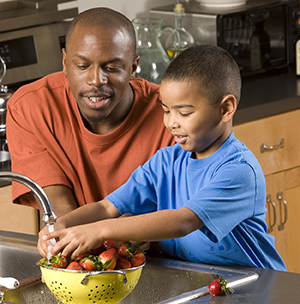When Your Child Has Constipation
Constipation is a common problem in children. This often leads to straining or having trouble pooping.
Constipation means your child:
-
Has fewer bowel movements than usual.
-
Complains of pain during a bowel movement.
-
Is having dry, hard, or difficult-to-pass stools.
What causes constipation?
Constipation can be caused by:
-
Too little fiber in the diet.
-
Too little liquid in the diet.
-
Not enough exercise.
-
Painful past poops (bowel movements). This can lead to your child holding in their poop.
-
Stress and anxiety issues. These can include changes in routine, problems at home or school, or travel to a new place.
-
Certain medicines.
-
Too much cow's milk.
-
Physical problems. These can include abnormalities of the colon or rectum (fissures and other painful conditions of the anus).
-
Recent illness or surgery. This could be from dehydration and medicines.
What are common symptoms of constipation?
How is constipation diagnosed?
The doctor examines your child. You’ll be asked about your child’s symptoms, diet, health, and daily routine. Your child may need tests like a rectal exam or X-rays to rule out other problems.
How is constipation treated?

The doctor can talk to you about treatment choices. Your child may need to:
-
Eat more fiber and drink more liquids. Fiber is found in most whole grains, fruits, and vegetables. It adds bulk and absorbs water to soften poop. This helps poop pass through the colon more easily. Drinking water and moderate amounts of certain fruit juices, such as prune or apple juice, can also help soften poop. Having a regular meal schedule is also important.
-
Get more exercise. Exercise can help the colon work better and ease constipation.
-
Take stool softeners. The doctor may suggest stool softeners to soften your child's poop. Your child should take them until having a bowel movement becomes more regular and the diet is adjusted. Discuss with your child's doctor exactly which medicines to give you child and for how long.
-
Do bowel retraining. The doctor may tell you to have your child sit on the toilet for 5 to 10 minutes at a time, several times a day. The best time to do this is after a meal. This helps the child relearn the feeling of needing to poop. Your child may be taught good sitting position on the toilet to help relax the muscles and prevent straining. This may be sitting on the toilet with support under the feet so the knees are above the level of the hips.
When to contact the doctor
Contact your child's doctor if:
-
Your child is vomiting repeatedly or has green or bloody vomit.
-
Your child is constipated for more than 2 weeks.
-
Your child has blood mixed in their poop or has very dark or tarry poop.
-
Your child often has poop stains in their underpants.
-
Your child cries or complains about belly pain not relieved by farting (passing gas).
-
Your child has trouble peeing in addition to trouble pooping.
-
Your child's belly pain gets worse.
© 2000-2025 The StayWell Company, LLC. All rights reserved. This information is not intended as a substitute for professional medical care. Always follow your healthcare professional's instructions.